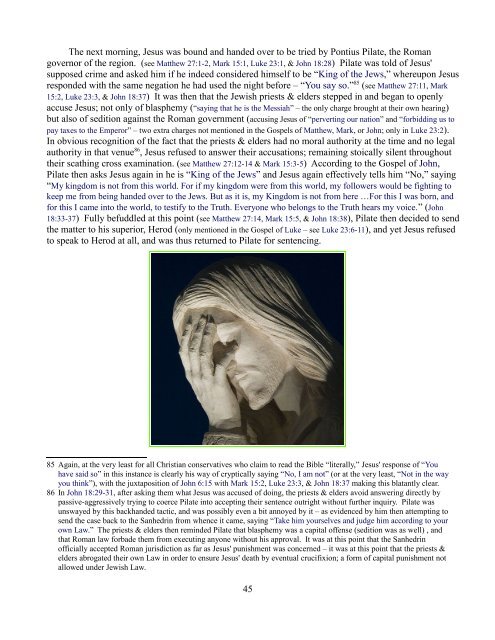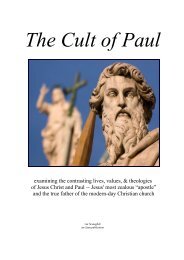Jesus Christ - a most Holy Heretic
An illuminating (and biblically exhaustive) examination of the little-known truth that Jesus Christ was not so much a supporter of the Old Testament laws of his day as he was a radically thorough reformer thereof
An illuminating (and biblically exhaustive) examination of the little-known truth that Jesus Christ was not so much a supporter of the Old Testament laws of his day as he was a radically thorough reformer thereof
Create successful ePaper yourself
Turn your PDF publications into a flip-book with our unique Google optimized e-Paper software.
The next morning, <strong>Jesus</strong> was bound and handed over to be tried by Pontius Pilate, the Roman<br />
governor of the region. (see Matthew 27:1-2, Mark 15:1, Luke 23:1, & John 18:28) Pilate was told of <strong>Jesus</strong>'<br />
supposed crime and asked him if he indeed considered himself to be “King of the Jews,” whereupon <strong>Jesus</strong><br />
responded with the same negation he had used the night before – “You say so.” 85 (see Matthew 27:11, Mark<br />
15:2, Luke 23:3, & John 18:37) It was then that the Jewish priests & elders stepped in and began to openly<br />
accuse <strong>Jesus</strong>; not only of blasphemy (“saying that he is the Messiah” – the only charge brought at their own hearing)<br />
but also of sedition against the Roman government (accusing <strong>Jesus</strong> of “perverting our nation” and “forbidding us to<br />
pay taxes to the Emperor” – two extra charges not mentioned in the Gospels of Matthew, Mark, or John; only in Luke 23:2).<br />
In obvious recognition of the fact that the priests & elders had no moral authority at the time and no legal<br />
authority in that venue 86 , <strong>Jesus</strong> refused to answer their accusations; remaining stoically silent throughout<br />
their scathing cross examination. (see Matthew 27:12-14 & Mark 15:3-5) According to the Gospel of John,<br />
Pilate then asks <strong>Jesus</strong> again in he is “King of the Jews” and <strong>Jesus</strong> again effectively tells him “No,” saying<br />
“My kingdom is not from this world. For if my kingdom were from this world, my followers would be fighting to<br />
keep me from being handed over to the Jews. But as it is, my Kingdom is not from here …For this I was born, and<br />
for this I came into the world, to testify to the Truth. Everyone who belongs to the Truth hears my voice.” (John<br />
18:33-37) Fully befuddled at this point (see Matthew 27:14, Mark 15:5, & John 18:38), Pilate then decided to send<br />
the matter to his superior, Herod (only mentioned in the Gospel of Luke – see Luke 23:6-11), and yet <strong>Jesus</strong> refused<br />
to speak to Herod at all, and was thus returned to Pilate for sentencing.<br />
.<br />
85 Again, at the very least for all <strong>Christ</strong>ian conservatives who claim to read the Bible “literally,” <strong>Jesus</strong>' response of “You<br />
have said so” in this instance is clearly his way of cryptically saying “No, I am not” (or at the very least, “Not in the way<br />
you think”), with the juxtaposition of John 6:15 with Mark 15:2, Luke 23:3, & John 18:37 making this blatantly clear.<br />
86 In John 18:29-31, after asking them what <strong>Jesus</strong> was accused of doing, the priests & elders avoid answering directly by<br />
passive-aggressively trying to coerce Pilate into accepting their sentence outright without further inquiry. Pilate was<br />
unswayed by this backhanded tactic, and was possibly even a bit annoyed by it – as evidenced by him then attempting to<br />
send the case back to the Sanhedrin from whence it came, saying “Take him yourselves and judge him according to your<br />
own Law.” The priests & elders then reminded Pilate that blasphemy was a capital offense (sedition was as well) , and<br />
that Roman law forbade them from executing anyone without his approval. It was at this point that the Sanhedrin<br />
officially accepted Roman jurisdiction as far as <strong>Jesus</strong>' punishment was concerned – it was at this point that the priests &<br />
elders abrogated their own Law in order to ensure <strong>Jesus</strong>' death by eventual crucifixion; a form of capital punishment not<br />
allowed under Jewish Law.<br />
45

















